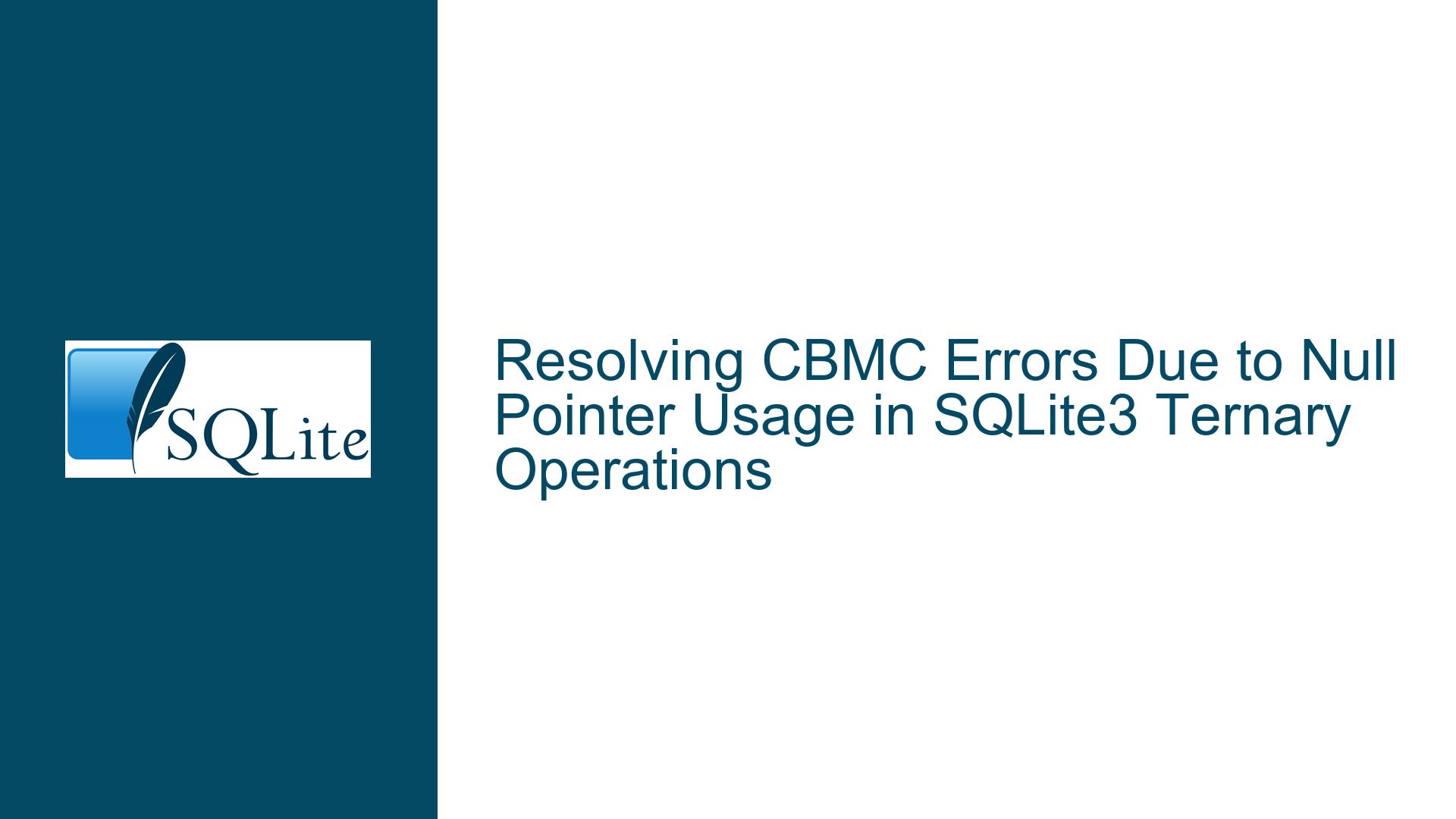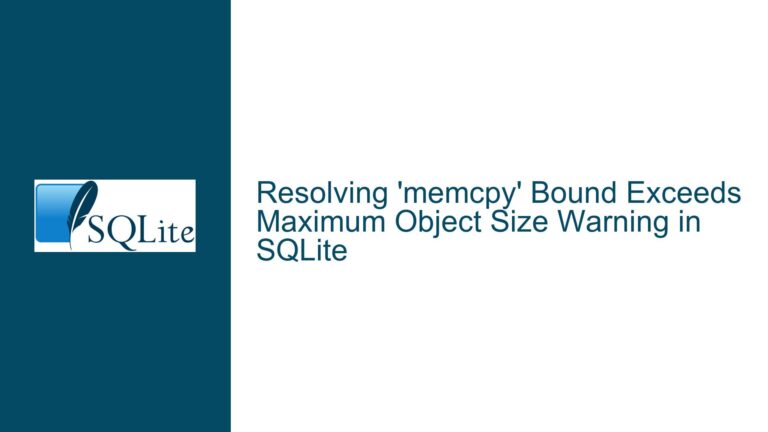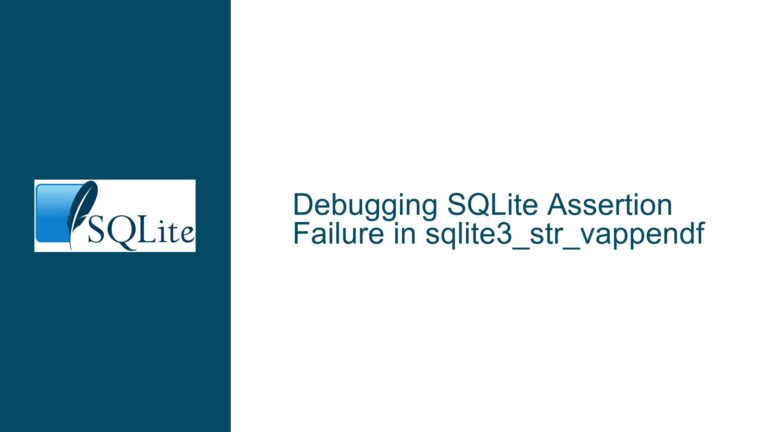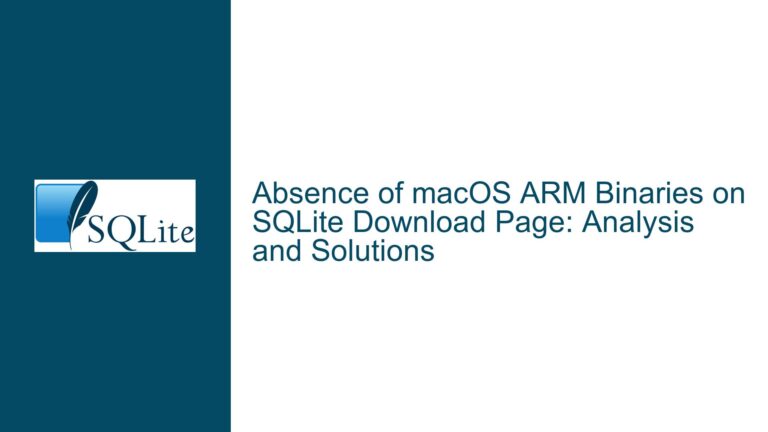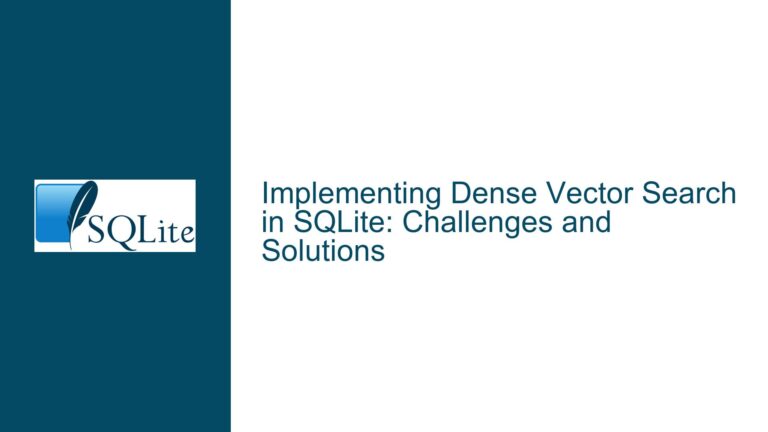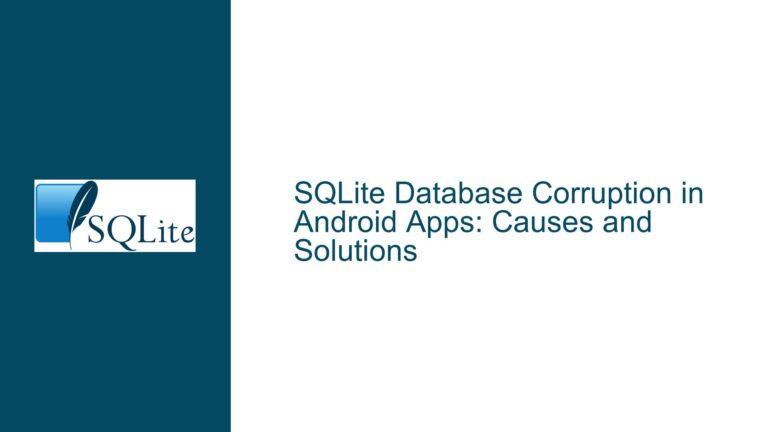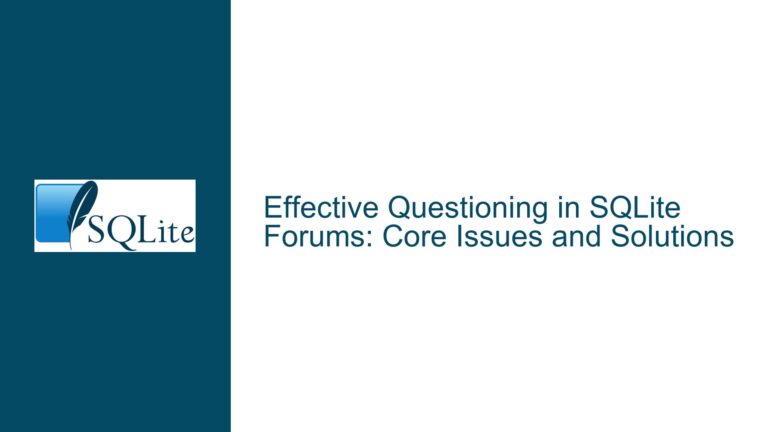Resolving CBMC Errors Due to Null Pointer Usage in SQLite3 Ternary Operations
CBMC Static Analysis Errors in SQLite3: Ternary Operator Type Mismatch with Null Pointers
Issue Overview: CBMC Fails to Recognize Null Pointer Context in sqlite3ErrorWithMsg Calls
The core issue arises when using the C Bounded Model Checker (CBMC) to analyze SQLite3’s codebase. CBMC raises errors related to the ternary operator (?:) in calls to the sqlite3ErrorWithMsg function. The errors manifest as type mismatches between string literals (e.g., "%s") and the integer 0 in contexts where a null pointer is expected. For example:
sqlite3ErrorWithMsg(db, rc, (zErr ? "%s" : 0), zErr);
CBMC reports an error such as:
operator ?: not defined for types 'char [3]' and 'signed int'
This occurs because CBMC’s type-checking logic interprets 0 as a signed integer rather than a null pointer. In standard C, the literal 0 in a pointer context is treated as a null pointer, but CBMC’s parser does not implicitly recognize this conversion. The result is a static analysis failure, even though the code is syntactically and semantically valid under modern C standards. The problem is exacerbated by SQLite’s use of 0 as a null pointer in ternary expressions where one branch is a string literal (e.g., "%s").
The sqlite3ErrorWithMsg function is designed to accept a format string followed by variadic arguments. When zErr (or similar variables) is non-null, the format string "%s" is passed to format the error message. When zErr is null, the 0 is intended to act as a null pointer, indicating no format string. However, CBMC’s strict type-checking logic interprets 0 as an integer, leading to a type conflict between char* (from "%s") and int.
This discrepancy highlights a tension between language standards compliance and static analysis tooling. While SQLite adheres to the C standard’s rules for null pointers, CBMC’s parser imposes stricter type constraints. The issue is not unique to SQLite but reflects broader challenges in reconciling codebases with static analysis tools that enforce rigid type-checking rules.
Possible Causes: CBMC’s Type Resolution and C Standard Nuances
1. CBMC’s Incomplete Handling of Null Pointer Constants
CBMC’s parser may not fully implement the C standard’s rules for null pointer constants. According to the C11 standard (Section 6.3.2.3), an integer constant expression with the value 0, or such an expression cast to void*, is a null pointer constant. This means 0 in a pointer context (e.g., as an argument to a function expecting a char*) should be treated as a null pointer. However, CBMC’s type-checker appears to treat 0 as an integer literal, leading to a type mismatch when it is used alongside a string literal in a ternary operator.
2. Ternary Operator Type Resolution in CBMC
The ternary operator (?:) in C requires that its second and third operands have compatible types. If one operand is a pointer and the other is a null pointer constant, the result type is the pointer type. For example:
zErr ? "%s" : 0
Here, "%s" is a char*, and 0 is a null pointer constant. The result of this expression should be a char*. However, CBMC may not apply this rule correctly, instead interpreting 0 as int and failing to resolve the expression to a common type. This suggests a limitation in CBMC’s type inference logic for ternary expressions involving null pointers.
3. SQLite’s Use of 0 for Null Pointers
SQLite’s codebase uses 0 (without an explicit cast) to represent null pointers in ternary expressions. While this is valid under the C standard, static analysis tools like CBMC that lack context-aware type resolution may flag it as an error. For example:
sqlite3ErrorWithMsg(db, rc, (zErr ? "%s" : 0), zErr);
Here, 0 is intended to represent a null char*, but CBMC treats it as an integer. This creates a conflict because the ternary operator’s two branches ("%s" and 0) are seen as having incompatible types (char* vs. int).
4. Toolchain Configuration and Language Dialect
CBMC may be configured to enforce stricter type-checking rules than those mandated by the C standard. For example, if CBMC is set to comply with older C standards (e.g., ANSI C) or if it enables pedantic warnings, it might reject implicit conversions between 0 and pointers. Additionally, CBMC’s internal representation of pointers and integers could differ from standard C implementations, leading to false positives.
Troubleshooting Steps, Solutions & Fixes: Resolving CBMC Errors in SQLite3
Step 1: Validate CBMC’s Compliance with C Standards
Before modifying SQLite’s code, confirm whether CBMC’s behavior aligns with the C standard. Review CBMC’s documentation to determine:
- Whether it supports the C11 standard’s null pointer rules.
- If there are flags to enable/disable strict type-checking for pointers.
Example Command:
cbmc --version
cbmc --help | grep "C standard"
If CBMC supports C11, run the analysis with explicit standard compliance flags:
cbmc --c11 sqlite3.c
Step 2: File a Bug Report with CBMC Developers
If CBMC does not handle null pointer constants correctly, file a bug report with the CBMC team. Include:
- A minimal reproducible example (e.g., a small C file with
zErr ? "%s" : 0). - The exact error message from CBMC.
- References to the C11 standard (Section 6.3.2.3).
Sample Bug Report:
Subject: CBMC Fails to Recognize Null Pointer Constant in Ternary Operator
Description:
CBMC incorrectly reports a type error when using `0` as a null pointer in a ternary expression. For example:
const char* str = zErr ? "%s" : 0;
CBMC error:
operator ?: not defined for types 'char [3]' and 'signed int'
Expected Behavior:
The expression should resolve to `char*`, as `0` is a null pointer constant per C11 6.3.2.3.
Step 3: Modify SQLite’s Code to Use Explicit Casts
If CBMC cannot be reconfigured or patched, modify SQLite’s code to include explicit casts. Replace 0 with (char*)0 in ternary expressions to resolve the type mismatch.
Example Fix:
// Original
sqlite3ErrorWithMsg(db, rc, (zErr ? "%s" : 0), zErr);
// Modified
sqlite3ErrorWithMsg(db, rc, (zErr ? "%s" : (char*)0), zErr);
Locations to Fix:
src/main.clines 3433, 3917src/vtab.cline 877src/notify.cline 187
Automated Fix with sed:
sed -i 's/\(zErrMsg ? "%s" : \)0/\1(char*)0/g' src/main.c
sed -i 's/\(rc ? "database is deadlocked" : \)0/\1(char*)0/g' src/notify.c
Step 4: Use Compiler Macros for Portability
Introduce a macro (e.g., NULL_PTR) to encapsulate the null pointer cast, improving readability and portability.
Example Macro:
#define NULL_PTR(type) ((type*)0)
Modified Code:
sqlite3ErrorWithMsg(db, rc, (zErr ? "%s" : NULL_PTR(char)), zErr);
Step 5: Suppress CBMC Warnings with Assumptions
If code modification is not feasible, use CBMC’s __CPROVER_assume to suppress warnings. This approach is less ideal but useful for temporary workarounds.
Example:
if (zErr) {
__CPROVER_assume(zErr != 0);
sqlite3ErrorWithMsg(db, rc, "%s", zErr);
} else {
sqlite3ErrorWithMsg(db, rc, 0);
}
Step 6: Update SQLite’s Code Style Guidelines
To prevent future issues, update SQLite’s coding conventions to prefer NULL over 0 for pointers. While NULL is not strictly necessary in standard C, it improves clarity and tool compatibility.
Example:
#include <stddef.h> // Ensure NULL is defined
sqlite3ErrorWithMsg(db, rc, (zErr ? "%s" : NULL), zErr);
Step 7: Collaborate with CBMC and SQLite Communities
Engage both the CBMC and SQLite communities to address the root cause. For example:
- Propose a patch to CBMC to improve null pointer handling.
- Discuss with SQLite maintainers the feasibility of adopting
NULLor casts.
Example Email to SQLite Mailing List:
Subject: Proposal: Use Explicit Null Pointer Casts for Static Analysis
Hi SQLite Team,
CBMC users have encountered type errors in ternary expressions using `0` as a null pointer. Adding explicit casts (e.g., `(char*)0`) would resolve these issues without affecting standard compliance. Would the team accept a patch for this?
Step 8: Evaluate Alternative Static Analysis Tools
If CBMC remains incompatible, evaluate alternatives like Frama-C, Clang Static Analyzer, or Coverity. Compare their handling of null pointers and ternary expressions.
Example Clang Command:
clang --analyze -Xanalyzer -analyzer-output=text sqlite3.c
Step 9: Implement Conditional Compilation Directives
Use preprocessor directives to conditionally include casts when CBMC is in use. This keeps the original code intact for other toolchains.
Example:
#ifdef CBMC
#define NULL_CAST(type) (type*)0
#else
#define NULL_CAST(type) 0
#endif
sqlite3ErrorWithMsg(db, rc, (zErr ? "%s" : NULL_CAST(char)), zErr);
Step 10: Conduct a Comprehensive Code Audit
Identify all instances where 0 is used as a null pointer in ternary expressions. Use regex searches to locate patterns like "\? \".*\" : 0".
Example grep Command:
grep -rnE '\\? ".*" : 0' src/
Final Recommendation
The optimal solution depends on the project’s constraints:
- Short Term: Apply explicit casts in SQLite’s code to satisfy CBMC.
- Medium Term: Collaborate with CBMC developers to improve null pointer handling.
- Long Term: Adopt
NULLor macros to enhance code clarity and tool compatibility.
By addressing the type resolution discrepancy between CBMC and standard C, developers can maintain rigorous static analysis without sacrificing code correctness.
